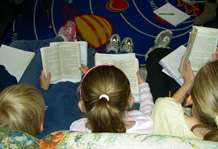Pupils taught to love grammar get better results

(������ƵOrg.com) -- In what is believed to be the first major study to demonstrate that the teaching of grammar can improve children’s overall writing capabilities, researchers found a quantifiable benefit from a focus not just on getting pupils to know grammatical terms, but on encouraging them to experiment with how they use grammar in written composition.
Pupils taught in this way were found to improve their writing marks over a year almost twice as much as those who were not.
Professor Debra Myhill of the University of Exeter’s Graduate School of Education, who led the research, said: “Grammar can be taught in ways which go beyond simply knowing terms and categories, towards encouraging pupils to love playing with grammar and language. If teachers take this approach, the evidence suggests pupils’ writing will improve.”
The findings have now been presented at the British Educational Research Association’s annual conference in London.
Researchers at the University of Exeter selected at random 31 comprehensives in the West Midlands and South West of England. The academics’ experiment, which lasted a year, involved a class of 12- to 13-year-olds in each school.
Half of the schools had a class where teachers followed teaching methods drawn up by the researchers – the ‘intervention group’ - and for the other half – the ‘comparison group’ - the teacher was allowed to devise his or her own teaching plan.
Pupils following both types of approach took a specially-designed writing test at the start of the experiment. This assessed the quality of children’s sentence structure and punctuation; text organisation; and overall imaginative effect. Each child then took a similar test at the end of the year.
The teaching approach for the ‘intervention group’ eschewed either simply asking pupils to identify and learn grammatical terms, or getting them to follow simple instructions such as “try to use complex sentences in your writing”, which the academics say has been a common approach within English teaching following the introduction of Labour’s national teaching strategies within the last 15 years and which featured in the ‘comparison group’.
Instead, youngsters were set tasks including looking at how writers can use nouns and verbs - rather than adjectives and adverbs - to add character and setting to their compositions; to re-write a letter in which changes in punctuation dramatically change its meaning; and to experiment with poetry by using, for example, verbless or one-word sentences. Other exercises even saw them analysing the grammar of jokes and even discussing “the humour of ambiguous punctuation”.
In the comparison group, pupils tended to follow the standard approach to the teaching of the subject, in which grammatical terms are covered, but pupils do not interact with them in the same way.
By the end of the year, the ‘intervention group’ had improved their marks by 20 per cent, while the ‘comparison group’ also improved, but only by 11 per cent.
Professor Myhill said that, despite decades of investigation, no previous study had shown that pupils being taught grammar explicitly – so that they were simply able to identify nouns or subject clauses, for example - actually improved the quality of their writing.
However, the study demonstrated that getting children to engage more actively with the use of grammar to make their language more powerful was effective.
Professor Myhill added: “It’s not just about teaching pupils to use grammar accurately. Accuracy is really important, but it’s not sufficient. You can have a really accurate, but dull, piece of writing. This is about using the language creatively: being able to manipulate grammar for effect, and giving children power over the use of language.”
Some of the humorous examples of punctuation used illustrate the playfulness of the approach. Exercises included how changing the punctuation of “A woman, without her man, is nothing.” to “A woman. Without her, man is nothing.” changes the meaning; how the wartime headline “Allies Push Bottles Up Germans” can be read differently depending on which words are nouns and which is a verb; and how punctuation would remove the ambiguity around cricket commentator Brian Johnston’s legendary radio declaration that “The bowler’s Holding; the batsman’s Willey”.
The study’s findings were not completely definitive for all pupils. Higher-achieving pupils benefited from the teaching more than the less able, suggesting it may have been pitched at the needs of better writers. And lesson observations completed as part of the study found examples of teachers struggling to explain grammatical concepts, including sometimes giving incorrect grammatical explanations. Teachers’ own understanding had an effect on the scheme’s overall effectiveness, with staff who were less competent with language getting worse results than more grammatically-secure colleagues within the “intervention” group.
Teaching materials used in the study are now to be offered free to teachers through the National Association for the Teaching of English.
“Reconceptualising grammar: an intervention study” was presented by Professor Debra Myhill at BERA on Wednesday 7 September.
Provided by University of Exeter

















